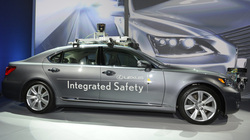
Driverless cars have been a staple of sci-fi movies for years, with Tom Cruise being flown around by futuristic pods in Minority Report or Arnold Schwarzenegger dealing with a creepy automated cab in Total Recall. Until recently, it seemed as though human drivers would always be pushing pedals and turning wheels to perform the act of driving a vehicle. Now, though, many companies have had amazing breakthroughs in driverless technology. It could mean more relaxation for drivers, but more headaches for your legal rights.
Earlier this year, Google reported that it planned to deploy a fleet of driverless cars which would have no brakes or steering wheels. Although no one can say for sure when the project will be ready to hit the streets for consumers, the results so far have been fairly impressive.
Drivers could gain hours of productivity, and probably put years on their lives, by avoiding the time and frustration of driving themselves to work each day. But when an accident occurs and someone is injured, who will be responsible?
If driverless cars share the road with traditional vehicles, there are bound to be plenty of accidents. Will we presume that the driverless car is not at fault, because it is computer driven? When there is an inevitable glitch in the system, what happens then? Lastly, since most automated vehicles currently have a manual system, who bears responsibility if the accident occurs due to a switch from automatic to manual? It is possible that driverless vehicle manufacturers may become directly liable to injured accident victims.
These vehicles won't be allowed onto the road unless insurance companies will provide auto insurance on them. These questions are being pondered by the insurance companies, who want to see how the vehicles perform "in real life" before they take on the risks. Insurance companies will also likely add new coverages to auto insurance, such as "cyber coverage" to protect vital computer systems within the car.
So, although there are obvious benefits for the average driver, don't expect a smooth or painless transition. Instead, it is likely to be a very awkward time for drivers and injured accident victims.
Earlier this year, Google reported that it planned to deploy a fleet of driverless cars which would have no brakes or steering wheels. Although no one can say for sure when the project will be ready to hit the streets for consumers, the results so far have been fairly impressive.
Drivers could gain hours of productivity, and probably put years on their lives, by avoiding the time and frustration of driving themselves to work each day. But when an accident occurs and someone is injured, who will be responsible?
If driverless cars share the road with traditional vehicles, there are bound to be plenty of accidents. Will we presume that the driverless car is not at fault, because it is computer driven? When there is an inevitable glitch in the system, what happens then? Lastly, since most automated vehicles currently have a manual system, who bears responsibility if the accident occurs due to a switch from automatic to manual? It is possible that driverless vehicle manufacturers may become directly liable to injured accident victims.
These vehicles won't be allowed onto the road unless insurance companies will provide auto insurance on them. These questions are being pondered by the insurance companies, who want to see how the vehicles perform "in real life" before they take on the risks. Insurance companies will also likely add new coverages to auto insurance, such as "cyber coverage" to protect vital computer systems within the car.
So, although there are obvious benefits for the average driver, don't expect a smooth or painless transition. Instead, it is likely to be a very awkward time for drivers and injured accident victims.
 RSS Feed
RSS Feed
